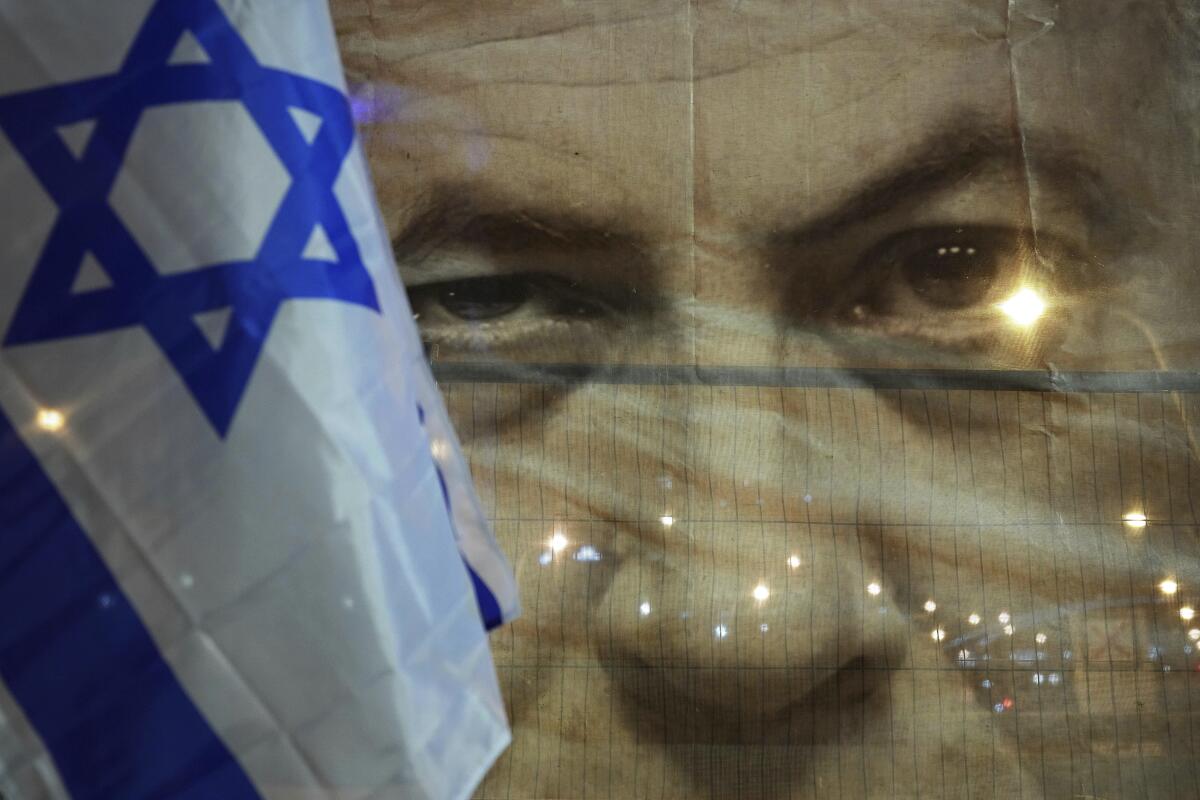Is Israel’s new government destroying democracy? Blinken surveys situation on Middle East trip

- Share via
CAIRO — As Israel in recent weeks put together its most right-wing, religiously conservative government in history, senior U.S. officials insisted on waiting and seeing just how radical things would get.
They emphasized “policies,” not “personalities.”
Now, nearly a month into a government led by returning Prime Minister Benjamin Netanyahu and populated by ultra-Orthodox politicians, it is already clear that a new bar is being set in controversial actions and extreme ideologies. Secretary of State Antony J. Blinken arrives in Israel on Monday to take stock of the situation, but can he be effective given the Israeli government’s momentum?
Many in and outside of Israel fear the democracy that the country long claimed to be — often billed the “only democracy in the Middle East” — is in danger of being badly eroded.
“The 75th anniversary of Israel’s independence will be remembered as the year in which the country’s democratic identity was dealt a fatal blow,” the president of Israel’s Supreme Court, Esther Hayut, said in an angst-ridden speech earlier this month in the Israeli city of Haifa.
Tens of thousands of Israelis — young, old and mostly secular — have poured into streets every weekend this month to protest the changes Netanyahu and his coalition are planning that opponents believe will curtail civil liberties.
Adding to the volatility of the moment, there has been a spasm of the deadliest violence in Israel and the West Bank in years. On Thursday, Israel carried out a raid in the Palestinian city of Jenin, killing nine Palestinian militants and civilians. Twenty-four hours later, a suspected Palestinian gunman shot and killed seven Israelis outside a synagogue in Jerusalem.
With tensions escalating, Blinken traveled to Cairo on Sunday and on Monday will hold what are expected to be thorny talks in Jerusalem and the West Bank city of Ramallah. The trip had been planned before the recent violence.
Though Blinken is the most senior U.S. official to meet with the new Israeli government, he is one of several top officials who have attempted to sound out the incoming regime as the Biden administration seeks to de-escalate the Israeli-Palestinian conflict and minimize the potentially damaging fallout from Netanyahu’s new policies.
Blinken and other U.S. officials have been criticized in some quarters for being too circumspect in their approach to the new Israeli government.
Antony J. Blinken had hoped to broach a wide agenda in the Middle East. But after deadly attacks in the region, security again tops the list.
“We will gauge the government by the policies it pursues rather than individual personalities,” Blinken said last month. But, he added, “we will also continue to unequivocally oppose any acts that undermine the prospects of a two-state solution,” the vision of an independent Palestinian state existing alongside Israel. Those acts include moves the new Israeli government is already making, such as the expansion of Jewish settlements in the Palestinian-claimed West Bank, and demolitions of and evictions from Palestinian homes.
Blinken also said he would emphasize the “shared values” of the United States and Israel — democracy and representation.
But so far, he has refrained from publicly criticizing the Netanyahu government.
On Sunday, Netanyahu and his Cabinet had already embarked upon taking familiar punitive actions as Jewish settlers across the West Bank attacked Palestinians and their property, according to human rights monitors and Palestinian media.
In the wake of the latest shootings, Netanyahu on Sunday announced plans to demolish the homes of two assailants, cancel their families’ social security benefits, expand gun permits for Israeli Jews and “strengthen” Jewish settlements in the occupied West Bank — which could mean more military protection and other fortification.
U.S. officials say there is an extra danger in the latest violence. Instead of being the work of the militant Gaza-based Hamas organization, it is more “organic,” orchestrated by homegrown groups in the West Bank whose belligerence is fed by frustration, years of occupation and a belief that Palestinian leadership is ineffective.
The dilemma for Blinken, who is meeting with Egyptian, Israeli and Palestinian leaders while on his trip to the Middle East this week, is that the violence that has victimized Israelis makes it more difficult to raise with Netanyahu — publicly, but even privately to an extent — issues such as the imperative for a Palestinian state and the preservation of democracy.
Preserving the status quo will rankle opponents of the Netanyahu government.
“Business as usual” is no longer sufficient, said Nimrod Goren, a fellow at the Middle East Institute in Washington and president of Mitvim, a think tank in Israel that studies regional politics.
“We want to see the ‘values-based relationship’ in action,” he said. “We see our democracy being shattered very quickly and want to hear support from [Western] liberal politicians.”
Netanyahu and his coalition have launched their precedent-breaking campaign starting with Israel’s judiciary and legal system. They contend that much of the court system is overly politicized and are moving to reduce the Supreme Court’s position as a balance to the power of the Knesset, or parliament.
Under the proposal, a Knesset majority would be able to override Supreme Court decisions. Politicians would also have a greater role in selecting judges.
Many in Israel suspect this so-called reform is a ploy by Netanyahu to make a criminal corruption case against him disappear. But its implications go much further, according to critics who say the court has often been the arbiter that pushed human rights legislation and held the government and military accountable for their actions.
In addition, ultra-Orthodox members of the Cabinet, enjoying unprecedented power thanks to Netanyahu’s deal-making coalition-building, want to inject more religion into education and make it harder for non-Orthodox foreign Jews to obtain Israeli citizenship. They have also condemned LGBTQ rights.
“What [Netanyahu] is doing is nothing short of waging war on Israeli democracy, and if he succeeds, Israel may change forever,” retired veteran Israeli diplomat Alon Pinkas said, writing in the Haaretz newspaper. “Rest assured, this is patently an effort to bring about regime change.”
Preferring to focus on security, Blinken is reluctant to attack domestic Israeli policy such as the judicial overhaul, aides say, and is likely to stick to more generic advocacy for democracy and civil rights.
Netanyahu and conservative supporters of his government dismiss most of the complaints as hyperbolic spin.
“The majority in Israel today is right wing and religious, and the minority is worried about their future,” said David Eliezrie, an Orange County rabbi who is director of the North County Chabad Center and is active in Israeli affairs.
Israel’s Supreme Court, for example, has long favored the left and the changes will impose “balance,” he said.
At a demonstration in Tel Aviv on Saturday night, protesters held a minute of silence for those killed in Friday’s synagogue shooting before speaking out on the dangerous trajectory they believe their government is following. The air was filled with both anger and resignation — and a sense of impotence.
”I feel that my country is coming apart,” said Yonatan Hazut, 29, a tech worker who lives in Tel Aviv. “Big demonstrations may not make a difference for politicians, but they would for investors and businessmen.”
Though Saturday’s protest was more subdued than the previous ones because of the synagogue attack, it was emphatic nevertheless.
“I have voted for Bibi Netanyahu all my life,” said Neta Naor, 65, referring to the prime minister by his nickname. “I don’t want a religious state here. It is very difficult for me to hear that many young people want to leave the country, that they feel they have no future.”
Special correspondent Tami Zer contributed from Tel Aviv.
More to Read
Get the L.A. Times Politics newsletter
Deeply reported insights into legislation, politics and policy from Sacramento, Washington and beyond. In your inbox twice per week.
You may occasionally receive promotional content from the Los Angeles Times.












